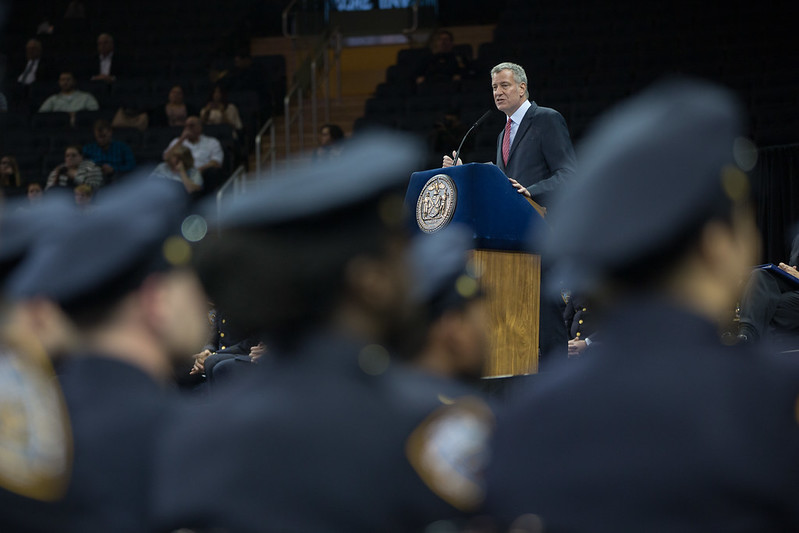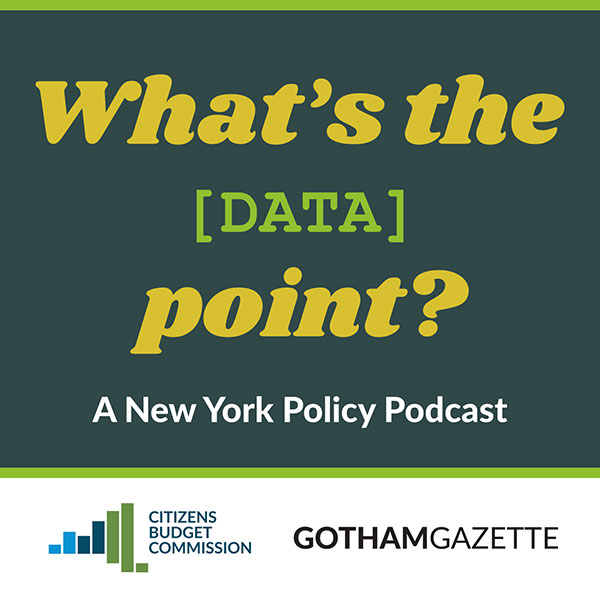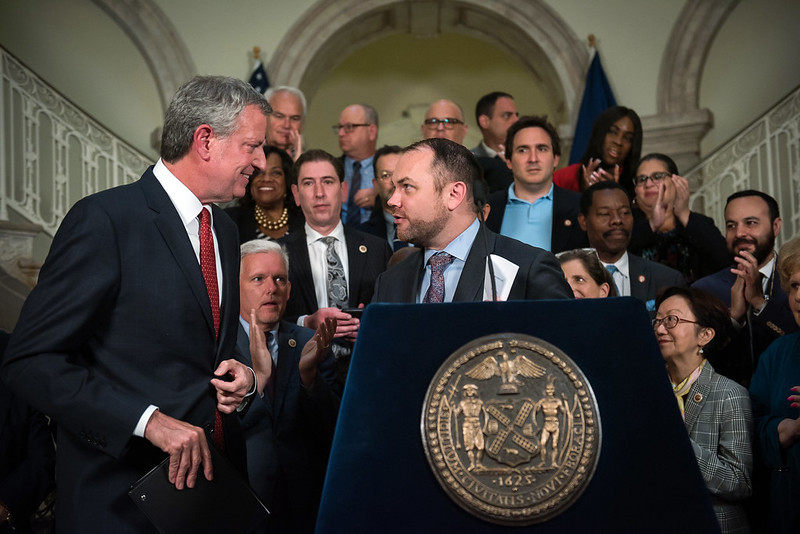Max & Murphy Podcast: Police Reformers Dissatisfied with NYPD Moves in City Budget

(photo: Michael Appleton/Mayor's Office)
July 1, 2020 - Max & Murphy Podcast: Police Reformers Dissatisfied with NYPD Moves in City Budget
 Joo-Hyun Kang of Communities United for Police Reform joined the show to discuss police reformers' dissatisfaction with the new city budget in terms of NYPD funding and related decisions.
Joo-Hyun Kang of Communities United for Police Reform joined the show to discuss police reformers' dissatisfaction with the new city budget in terms of NYPD funding and related decisions.
Listen to the conversation and let us know what you think -- we're on Twitter @TweetBenMax and @JarrettMurphy. You can listen to the show through the embedded audio below or download the episode wherever you get your podcasts, under "Max & Murphy," and listen to Max & Murphy live on Wednesdays at 5 p.m. on WBAI radio, 99.5FM or wbai.org.
***
by Ben Max, Gotham Gazette
@tweetBenMax @GothamGazette
What's The [DATA] Point? $88.2 Billion, The Fiscal 2021 New York City Budget

What's The [Data] Point? Episode 93 -- $88.2 billion, The Fiscal 2021 New York City Budget [You can download What's The [Data] Point? wherever you get your podcasts, including on iTunes]
$88.2 billion is the size of the new New York City budget adopted for Fiscal Year 2021 in a contentious, last-minute vote on June 30 into July 1. After years of economic expansion, this is the first budget Mayor de Blasio and Speaker Johnson negotiated in a recession. CBC's Ana Champeny joined the podcast to discuss why this is just the first of many challenging fiscal decisions ahead.
Listen to the conversation and let us know what you think: Ben Max of GG (@TweetBenMax), Maria Doulis of CBC (@MariaDoulis). Listen below or download wherever you get your podcasts!
***
by Ben Max, Gotham Gazette
@tweetBenMax @GothamGazette
De Blasio, City Council Agree on Contentious $88.2 Billion Crisis Budget with Focus on NYPD Shifts

City budget announcement from 2019 (photo: Ed Reed/Mayor's Office)
The New York City Council approved an $88.2 billion budget for the 2021 fiscal year shortly after midnight in one of the most divided votes for the legislative body in recent history. The new budget, which takes effect immediately for the July 1 start of the new fiscal year, is a sharp decline in expected city spending given cratering revenue brought on by the coronavirus pandemic and includes significant cuts to and funding shifts from the NYPD in response to recent mass protests against police brutality and over-policing. It passed with 32 "yes" votes and 17 "no" votes out of 50 (there is one vacant seat on the Council), with many Council members dissenting because they believed the cuts to the police department did not go far enough; yet others voted against the budget because they did not want to see any reduction in NYPD funding.
With just hours to go before the midnight deadline, Mayor Bill de Blasio and New York City Council Speaker Corey Johnson had separately announced on Tuesday that they had reached an agreement on the budget. The NYPD funding issue was central to contentious negotiations between the de Blasio administration and the Council, with the final result touted by de Blasio but leaving frustrated Johnson and a number of Council members to both the speaker’s left and right. The compromise infuriated activists who criticized the budget choices and gimmicks used to get to what the mayor called a $1 billion cut that had been targeted by reformers but Johnson acknowledged had not been met in reality.
This year’s budget proved to be the toughest that de Blasio has had to navigate. After years of the city being flush with cash and the mayor and two City Council classes growing the budget by over $20 billion, the city faced a $9 billion revenue shortfall because of the COVID-19 pandemic and its fallout. De Blasio had originally proposed a $95.3 billion spending plan in January and was forced to pare it down, while dipping $4 billion into reserves and finding about $2.7 billion from reductions to planned spending by city agencies and citywide savings.
Even as the bleak budget picture became starker and starker in March, April, and May, the city erupted into mass demonstrations after the police killing of George Floyd, an unarmed Black man in Minneapolis. The NYPD responded with force, supported more often than not by the mayor, creating a critical mass movement to defund policing and reinvest resources in communities of color. Advocates demanded that the mayor cut the NYPD’s $5.9 billion operating budget by $1 billion, receiving support from the City Council Speaker and many members, who were already questioning in April why the mayor had left the police department untouched while slashing funds for the city’s social safety net and youth services.
De Blasio and Johnson chose to forego the traditional “budget handshake” that indicates the two sides have come to an agreement, holding separate news conferences on Tuesday to announce the deal.
Stuck in a tough spot, the mayor had hoped for federal stimulus funds that never arrived and had also sought fiscal borrowing authority from the state government, whose leaders were reluctant to grant it. Without either, he warned that the city would have to lay off as many as 22,000 employees beginning in October. He has said he will work with labor unions to find $1 billion in savings to avoid such dismissals, while continuing to seek both federal aid and state permission for borrowing, which has not been completely taken off the table.
“With all these challenges, we still found a way to get to a budget that, again, focuses on your health, your safety, putting food on your table, making sure you have a roof over your head. That's the focus,” the mayor said to New Yorkers on Tuesday from City Hall.
The changes in NYPD funding totaled about $1 billion according to de Blasio’s math – about $484 million in reduced spending (including a promised $296 million drop in overtime spending and from a reduction in NYPD headcount), and $354 million in shifts to other city agencies accompanied by $162 million in a shift of fringe benefits costs. The budget outlines an at least temporarily lowered NYPD headcount by 1,163 uniformed officers by canceling two of four cadet classes this year. There are currently about 36,000 uniformed officers. School safety and school crossing guards will be moved out from under the NYPD and restored to the Department of Education, while homeless outreach will shift to the Department of Homeless Services.
“This is a lot of redistribution, but it's still done in a way that is safe for this city,” de Blasio said, in response to reporters’ questions. “That is the balance that I said we had to strike, and we have struck this balance.”
One of de Blasio’s main priorities was to keep the officer headcount stable in order to ensure a similar level of neighborhood patrols as exist now, and he said he was pleased to report that would be the case.
Johnson, who had targeted a larger reduction in the police force, was visibly deflated when he detailed the Council’s many victories and concessions in his own news conference. “Heart-wrenching, impossible decisions needed to be made in this budget,” he said, “and this Council was determined that we would protect and preserve as many vital programs and services as we could for vulnerable New Yorkers.”
The speaker noted that the budget does not cut $1 billion in direct NYPD spending as he had wanted, but repeatedly emphasized that he had to balance the wants and needs of a diverse City Council as well as face a mayor who refused to budge very far. Many Council members had already pledged to vote against the budget if it did not achieve the $1 billion goal while others were critical of those cuts, citing an increase in crime over the last few months.
Some members, including Johnson’s budget leadership team of Council Members Danny Dromm, Vanessa Gibson, and Laurie Cumbo, defended the deal and the speaker, outlining the challenging circumstances and explaining that some members of color presented particularly nuanced views about police presence and reform.
Johnson repeatedly said that he had not struck a deal that went as far as he had wanted but took to heart that the agreed upon steps would lead to systemic reforms, particularly by transforming school safety from a punitive system to one that focuses on restorative justice. “These are real changes and I stand by what we were able to accomplish in those areas,” he said. “To everyone who is disappointed that we did not go farther, I want to be very honest and candid, I am disappointed as well.”
Both Johnson and de Blasio pointed to the importance of how school safety agents are transitioned into a changed command structure, citing the importance of new training and protocols, while activists called the move a sham that will continue to criminalize student behavior.
Johnson argued that there were many cuts in the mayor’s executive budget that should not have been proposed in the first place and cited Council victories in restoring funding for them, most notably the restoration of the program providing paid work to young people.
“These are programs that address injustice and inequity, these are programs that support the social safety net, and address systemic inequality,” he said.
As he pointed out,the Council was able to broker the restoration of funds for education and youth that the mayor had planned to cut. They include $100 million in fair student funding for schools as well as investments in school counselors, social workers, and school health programs. The budget also includes about $116 million to reinstate the Summer Youth Employment Program (SYEP) and the COMPASS, Beacon, and Cornerstone summer camp programs, all of which were on the chopping block in the mayor’s budget proposal. SYEP had become the symbol of the mayor’s entrenchment with the police department at the expense of young people.
The mayor had also proposed eliminating the CUNY Accelerated Study in Associate Programs (ASAP), which has proved particularly helpful to lower-income public college students, but the Council fought to maintain it at $34.3 million. Among the other programs were investments in food security, public libraries, culture and arts funding, small businesses, senior services, housing, criminal justice, and services for domestic violence survivors and immigrants.
During the nearly three-hour long budget vote, Council members fell into three camps – those who supported the budget despite conceding it was far from perfect, those who felt the budget did not do justice to the widespread demands to make substantial cuts to the NYPD, and those who opposed any cuts to the NYPD budget.
Members such as Cumbo, Alicka Ampry-Samuel and Robert Cornegy, all Democrats voted for the budget, noted their disagreement with certain aspects of the "Defund the NYPD" movement, particularly the calls for a wholesale elimination of school safety agents, 80% of whom are Black women. The budget, they insisted, is a first step in a broader school safety reform conversation and includes funding for crucial services for communities of color.
"The pandemic has underscored our vulnerabilities and weaknesses and put us in a position to either drive down a hill or off a cliff," said Ampry-Samuel. She pointed out that the budget will shift more than $500 million from NYPD capital funding to youth recreation centers and public housing, will fund SYEP, and return school safety to its "rightful place" under the DOE. "Driving off a cliff would've been laying off hard working New Yorkers, gutting SYEP, overpolicing stressed out communities while waiting for federal aid that may never come to save us. But we were able to save ourselves."
"This budget is not an end to our policy making as a council, it is not a final chapter," said Cornegy. "It's not the conclusion of the important discussions we're having around policing and caring for our shared committees."
Though other members, also Democrats, commended the Council's push back against the mayor's cuts, they felt strongly that the Council had failed to appropriately address the critical mass of voices calling for cuts to the NYPD. Among them were Council Members Jimmy Van Bramer, Carlina Rivera, Antonio Reynoso and Donovan Richards, who chairs the public safety committee.
"Sadly the most historic part of this budget is how badly it manages to meet the moment," said Van Bramer. "The people have spoken through marches and rallies and by occupying City Hall. We must listen to the people we work for."
Richards said his vote against the budget was not only about the $1 billion cuts and cost shifts but about the culture of policing in the city. "A $1 billion budget cut can't address systematic racism that runs rampant within the NYPD," he said. "Today, we must send a clear message that it's not okay to kettle peaceful protesters, that it's not okay to place Black and brown New Yorkers in a chokehold as they gasp for air. We must send a clear message that it's not okay to shoot unarmed black men like Sean Bell and Ramallah Graham. Tonight, we must send a clear message that no one is above the law, not even the NYPD."
The three Republicans on the Council and certain moderate Democrats such as Bob Holden and Ruben Diaz Sr. expressed their support for the NYPD as they voted against the budget. "Friends, you're witnessing a moment where we are democratically electing to make the city of New York less safe, and I won't be a passive participant as we undo three decades of good work by our predecessors," said Council Member Joe Borelli, a Staten Island Republican, citing a recent uptick in shootings.
In explaining his vote, Council Member Holden, a Queens Democrat, said, "The political class of this city continues to disregard the people they serve. They continue to push policies that make the city and the constituents they are supposed to protect less safe."
Earlier in the day, dissatisfied with the developing compromise between the Council and the mayor, Public Advocate Jumaane Williams threatened at the last minute to use his charter authority “to prevent the budget from being executed during the final tax warrant process.” In a remote news conference on Tuesday morning, he pushed for a full hiring freeze at the police department and a solid commitment to a better school safety system.
Freddi Goldstein, a de Blasio spokesperson, said in response, “The NYPD budget is being cut by a historic $1 billion while maintaining safety on our streets. We’ve reached a fair deal that prioritizes our youth and communities most in need. That’s what New Yorkers need as they attempt to rebuild from a global pandemic that made our city the epicenter. The budget is effective as soon as Council passes it and is certified only by the mayor, comptroller, and city clerk.”
Williams may be able to hold up some tax revenue, but is likely to be challenged in court if he does attempt to do so.
In a statement after the budget passed, Williams expressed his disapproval. "In a moment when New Yorkers, with the entire nation, are demanding a reimagining of public safety, a reckoning with systemic injustices and inequities, the city falls far short with a budget that misses the moment of need," he said. The budget, he added, "perpetuates the idea that the NYPD is sacrosanct and the solution is always more police, and that we must accept this. This budget reiterates that message in a failure to commit on paper to a just transition for school safety. It is one that I cannot support and will not sign off on."
Comptroller Scott Stringer also criticized the mayor and City Council in a statement calling the supposed $1 billion cut a “bait and switch and a paper-thin excuse for reform.” “Meaningful change in this moment won’t come by shifting police from one agency to another, and budget tricks won’t bring an end to the status quo. The movement in the streets won’t be suppressed by manipulated math,” he said.
Andrew Rein, president of Citizens Budget Commission, a nonprofit fiscal watchdog, said in a statement, “New York City leaders may be breathing a sigh of relief for meeting the budget deadline after particularly arduous negotiations, but the fiscal crisis is far from over.” He said the budget is “precariously balanced” and does not address major budget gaps in the future. “New York City’s leaders did not make sufficient hard choices needed to put the City on a firmer fiscal foundation for the long term.”
The Council members who voted "yes" include Speaker Corey Johnson and Council Members Laurie Cumbo, Daniel Dromm, Vanessa Gibson, Adrienne Adams, Alicka Ampry-Samuel, Diana Ayala, Justin Brannan, Fernando Cabrera, Andrew Cohen, Margaret Chin, Robert Cornegy, Mathieu Eugene, Barry Grodenchik, Andy King, Peter Koo, Karen Koslowitz, Rory Lancman, Stephen Levin, Mark Levine, Farah Louis, Alan Maisel, I. Daneek Miller, Francisco Moya, Bill Perkins, Keith Powers, Ydanis Rodriguez, Debi Rose, Rafael Salamanca Jr., Ritchie Torres, Mark Treyger and Peter Vallone.
The Council members who voted "no" include Inez Barron, Joe Borelli, Steven Matteo, Chaim Deutsch, Ruben Diaz Sr., Mark Gjonaj, Bob Holden, Ben Kallos, Brad Lander, Carlos Menchaca, Donovan Richards, Antonio Reynoso, Carlina Rivera, Helen Rosenthal, Eric Ulrich, Jimmy Van Bramer and Kalman Yeger.
***
by Samar Khurshid, senior reporter, Gotham Gazette
@samarkhurshid @GothamGazette
Note - this article has been updated.




